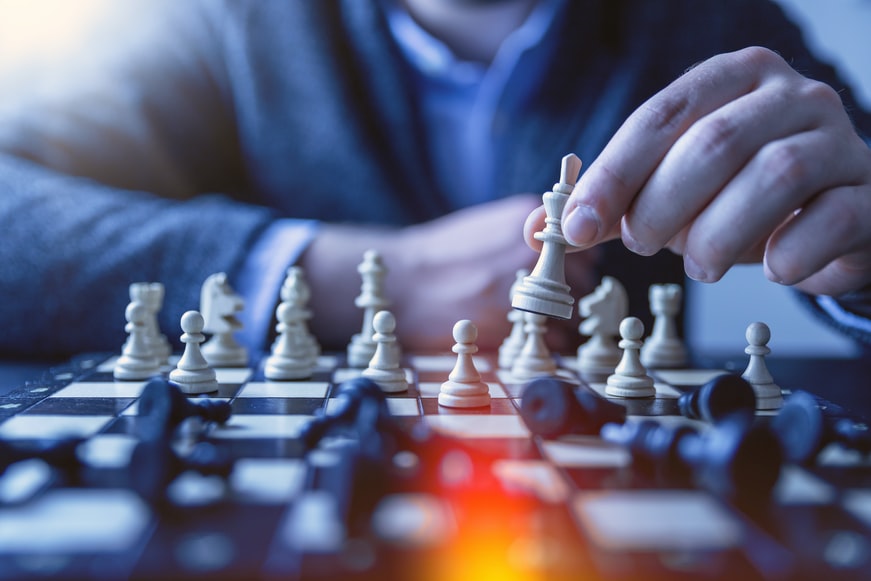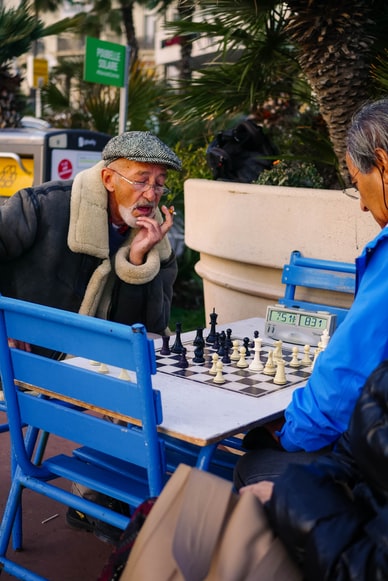Chess is one of the most challenging and intellectually stimulating hobbies out there. Life is nothing more than a great chess game, and each person we meet is a piece on the board. It is a sport and a hobby that teaches that no one is irreplaceable, that sometimes to achieve something great, we have to give up the things we love, that there is no victory without defeat. Honesty is another tremendous influence that chess brings to our lives. There is nothing hidden on the game board, a great way to live your life. If you play the game long enough, you will get to know yourself in ways that Buddhist monks can only hope; you will learn about your strengths and weaknesses and apply them accordingly in daily life.
Chess is a two-player strategy and tactics game played on an 8-by-8 cheered board. Although there are many other chess sets types and colors, the conventional colors are white and black, which we shall refer to the two players on this page. The goal of the game is to checkmate your opponent’s king by trapping it. A chess game can also be won if your opponent surrenders; this is known as resigning in chess, and there are other ways for a game to conclude in a draw, in which neither player wins. We’ll go through things in further depth later.
Chess Details
| Category: Competition, Games/Gaming, Mental, Social | Time: 30-60 min | Skill: Lots |
| Initial Cost: $ (0-50) | Space: little | People: small |
| Long-Term Cost: Low | Makes Money: No | Location: indoor |
History of Chess
Chess has a long and illustrious past. The chess game has evolved significantly since its inception in India. It wasn’t until the 16th century that the present version was discovered. The components were not standardized until the 19th century, and there were no clocks.
The Basic Skills
- Problem Solving – Chess, in its most basic form, is akin to a big puzzle. To “solve” a chess game, players must utilize problem-solving abilities to choose which pieces to move to get the most excellent possible results on the board. Chess teaches kids how to solve issues on the go as they progress and begin playing timed games.
- Abstract Reasoning – The capacity to engage in abstract reasoning is unquestionably advantageous to any learner of any age, both in and out of school. Chess helps kids learn to detect patterns on the game board and build strategies based on those patterns, which allows them to enhance their abstract thinking skills.
- Calmness Under Pressure – When asked to think of instances when most parents think of athletics when their children must remain calm under pressure, while sports may offer more dramatic moments, a youngster may only be required to make a game-winning shot once or twice during the season, if ever. In truth, few sports give as many opportunities to remain calm under pressure as a chess game does.
- Patience – The virtue of patience is instilled in youngsters as a result of this meticulous calculation. They must not only remain attentive while waiting for an opponent to take their turn, but they must also exhibit patience by not rushing the number of plays required to finish the game. The same cannot be true of athletic events, where the game ends when the clock runs out, and an active defense may frequently force a turnover.
- Sportsmanship – Learn chess by figuring out which moves work and which don’t work in various situations. There is nearly always a winner in a chess game, and players will quickly learn that they are about to lose matches from time to time.
- Creative Thinking – A chess player must have innovative thinking skills to overcome an opponent. They must picture what will happen with each potential move on the board throughout each round and then swiftly devise new plans on the fly.
- Pattern Recognition – Finally, pupils learn to detect and respond to patterns as they improve their chess skills. This entails understanding the many movement patterns that each chess piece may make and recognizing the potential repercussions of each available move, and making the best options possible based on how each piece is situated on the chessboard.
- Strategic Thinking – Students’ strategic thinking skills grow as they play chess and integrate all the skills listed above. To make their movements, they know to mix problem-solving, pattern identification, and creative thinking. They learn to wait until the perfect moment to make a bold move and that each defeat is only a chance to do better the following time.
The Rules of Chess
Chess games have a single goal in mind. Each player attempts to capture and ‘kill’ their opponent’s king chess piece. The phrase ‘checkmate‘ refers to the capture or death of the king.
Simultaneously, players should utilize their abilities to defend their pieces from being captured. If the king is to be ‘caught,‘ checkmate occurs. That indicates your army’s top-ranking chess piece is in check and unable to flee the capture.
Cost of Chess as a Hobby
Chess is one of the popular hobbies and games globally, with millions of players competing in local tournaments, international contests, and private games with friends and family. There are several advantages to learning to play chess; one of them is the opportunity to engage in a stimulating and enjoyable new activity! Let’s look at how you may include chess as a pastime in your life.
Benefits of Learning Chess
Chess is played every day all around the world, bringing people from all walks of life together. Let’s look at the top ten advantages of studying and playing chess!
- People are brought together.
- It teaches you how to win as well as how to lose.
- It can assist you in focusing on helping children in realizing the consequences of their actions.
- Chess Is a Learning Tool
- Enhances Creativity
- Builds Self-Belief
- Problem-solving skills are developed, and the brain is exercised.
- Chess might help you stay calm under pressure.
Here are seven pieces of Chess Equipment that every player should have
- Set of Chess
- Board for chess
- Chess Pieces
- Chess Table
- Score Sheets
- Chess Clocks
Conclusion
In chess, the main goal is to checkmate your opponent’s king. When a King can’t escape being captured, he’s checkmated, and the game is finished. The game is said to come to a halt. This puts a stop to the game right away.
Chess is fun because it is unpredictable. You never know what is going through a person’s head or how they are planning maneuvers. You never know how a game might end. Even after several movements.
This unpredictability leaves room for reflection. And it always keeps players hooked!


